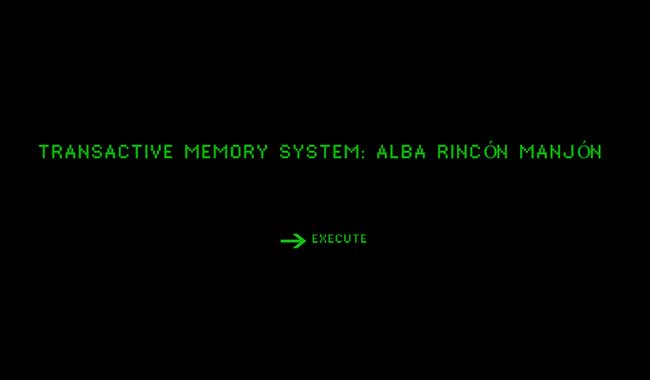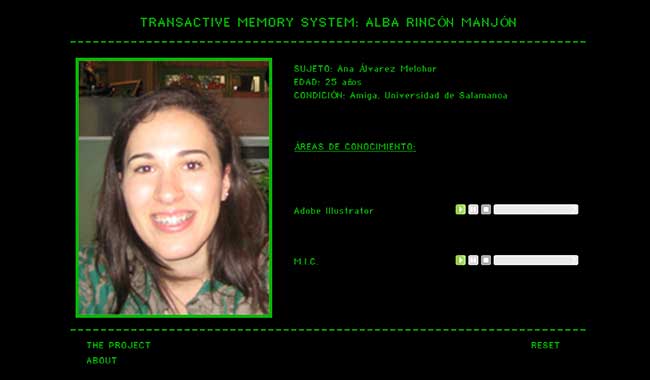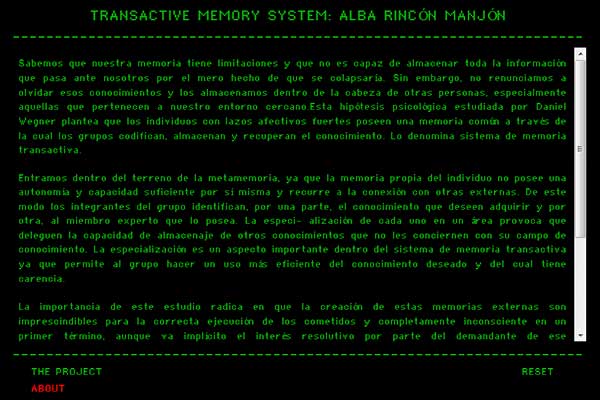Home
TRANSACTIVE MEMORY SYSTEM
Net art
Work in progress


Sabemos que nuestra memoria tiene limitaciones y que no es capaz de almacenar toda la información que pasa ante nosotros por el mero hecho de que se colapsaría. Sin embargo, no renunciamos a olvidar esos conocimientos y los almacenamos dentro de la cabeza de otras personas, especialmente aquellas que pertenecen a nuestro entorno cercano. Esta hipótesis psicológica estudiada por Daniel Wegner plantea que los individuos con lazos afectivos fuertes poseen una memoria común a través de la cual los grupos codifican, almacenan y recuperan el conocimiento. Lo denomina sistema de memoria transactiva.
Entramos dentro del terreno de la metamemoria, ya que la memoria propia del individuo no posee una autonomía y capacidad suficiente por sí misma y recurre a la conexión con otras externas. De este modo los integrantes del grupo identifican, por una parte, el conocimiento que deseen adquirir y por otra, al miembro experto que lo posea. La especi- alización de cada uno en un área provoca que deleguen la capacidad de almacenaje de otros conocimientos que no les conciernen con su campo de conocimiento. La especialización es un aspecto importante dentro del sistema de memoria transactiva ya que permite al grupo hacer un uso más eficiente del conocimiento deseado y del cual tiene carencia.
La importancia de este estudio radica en que la creación de estas memorias externas son imprescindibles para la correcta ejecución de los cometidos y completamente inconsciente en un primer término, aunque va implícito el interés resolutivo por parte del demandante de ese conocimiento.
Así pues, el proyecto se basa en mi sistema de memoria transactiva, Alba Rincón Manjón, el cual emulando una base de datos permite al usuario introducirse dentro de mi memoria y seleccionar las diferentes personas a las que recurro para la obtención de un área de conocimiento y el consiguiente registro del transvase de esa competencia. Este proyecto se trata de un work in progress indefinido ya que estará ampliándose de manera periódica al igual que mi memoria, sirviéndome además de una fuente extra de conocimiento a la que recurrir cuando lo necesite creando un segundo sistema de seguridad por si fallan las conexiones con los miembros del grupo.
It is known that our memory has limitations and it isn’t able to store all the information that happens in front of us because it would come to a standstill. However, we don’t renounce to forget knowledge and we store it within the head of others, specially, those who belong to our close environment. This psychological hypothesis studied by Daniel Wegner explains that individuals with strong bonds have a common memory through which groups encode, store and recover the knowledge. It is what he calls transactive memory system.
We enter into the area of metamemory, as the individual’s own memory doesn’t have enough autonomy and capacity by itself and resorts to another external ones. That way, the members of a group identify, on one side, the knowledge they want to acquire, and on the other side, the expert member that has it. The specialization of each of them on one area provokes that people delegate the storage of knowledge that it is not up to them into their own area of knowledge. The specialization is an important concept in transactive memory system as it allows the group to make a more efficient use of the required knowledge that they lack.
The important thing in this study is that the creation of these external memories is essential to the right execution of tasks and completely unconscious first, although it is implicit the resolute interest on the part of the person requesting that knowledge. So, the project, is based in my own transactive memory system, Alba Rincón Manjón, which emulating a data base allows user to gain access to my memory and select different people who I turn to in order to obtain certain knowledge and the consequent recording of the transfer of that competence.
This project is an unlimited work in progress as it would be increased periodically as my own memory, and being useful to me as an extra source of knowledge to which I can turn when I would need it, creating a second system in case of failure in connections with the members of the group.



